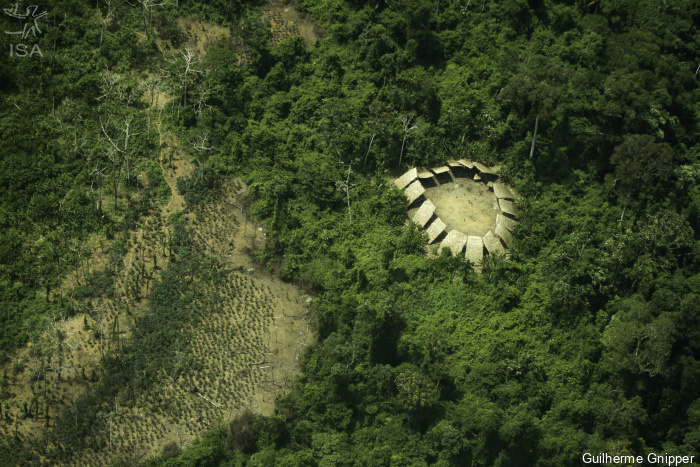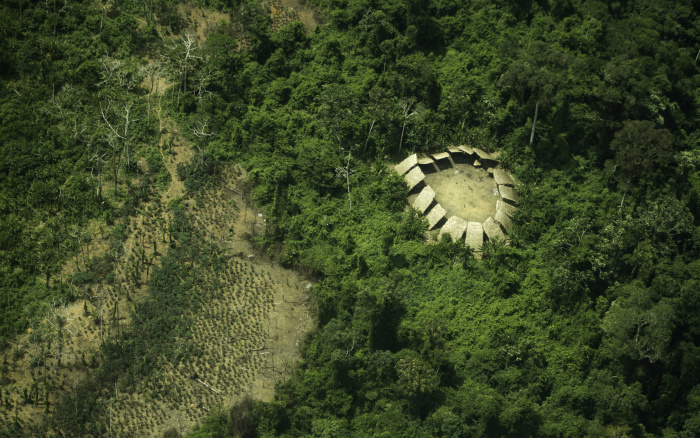Você está na versão anterior do website do ISA
Atenção
Essa é a versão antiga do site do ISA que ficou no ar até março de 2022. As informações institucionais aqui contidas podem estar desatualizadas. Acesse https://www.socioambiental.org para a versão atual.
The Contact of Death
Thursday, 06 de February de 2020 
Esta notícia está associada ao Programa:
The appointment of a missionary to coordinate Funai’s area for isolated indigenous peoples is one of the gravest developments in Bolsonaro’s ethnocidal policy.
Last Wednesday’s (5/2) appointment of Ricardo Lopes Dias, a pastor who has worked with the American sect Ethnos360, formerly known as New Tribes Mission, to head the CGIIRC (Funai’s Coordination of Isolated and Recently Contacted Indians), puts isolated indigenous people living in voluntary isolation on the verge of becoming genocide victims. In Brazil, 115 of these groups have been recorded, with 28 of them confirmed. The appointment of a missionary to lead the CGIIRC points to a return to the policy of forced contact which, when in force as a state policy during the 1970s, caused the death of thousands of indians through diseases and violence perpetrated by the public agents themselves. All of this could happen again with the return of forced religious proselytism.
Indigenous peoples in voluntary isolation are the survivors of massacres which took place throughout the 20th century, the largest of them during the 1970s, when the Brazilian state, under military dictatorship, promoted the so-called ‘fronts of attraction’ to contact and ‘pacify’ indigenous communities whose lands the government wished to occupy. In addition to the violence itself - there are countless reports of massacres, including the aerial bombing of villages - these communities were also victims of epidemics caused by non-indigenous people on oficial forced contact expeditions. Some indigenous populations lost 90% of their members to illnesses for which they had no antibodies.
This was the case of the Nambikwara, whose territory covers part of Mato Grosso and Rondonia. Before contact, their ethnic group was around 10,000 individuals. Nine thousand died as a result of outbreaks of measles, flu, whooping cough and gonorrhea. A similar situation was experienced by the Paraná, in the northern Mato Grosso. Between 1973 and 1976, 80% of the population died of influenza and malaria. Of 400 individuals, only 54 survived. There are numerous examples. In 1989, missionaries from the New Tribes Mission of Brazil, the same group the new Funai coordinator worked with, promoted forced contact with the last remaining members of the Zo’é ethnicity, in northern Pará. The contact resulted in an epidemic, with dozens of deaths. The missionaries were expelled from the territory.
Stopping the genocide of entire communities was the main reason for the institution of Funai’s no-contact policy in 1987. This policy, devised by sertanistas, anthropologists and other policymakers, was the basis for the creation of the CGIIRC. It consists in guaranteeing the protection of territories where these peoples live, preventing the entry of invaders and the construction of enterprises that affect them. This is, to this day, still the organ’s competence, established by Funai ordinance 281/2000.
With the appointment of a missionary as coordinator of this Funai department, the threat of forced contact, and with it the imminence of new tragedies, looms again.
It is the duty of the Brazilian state, provided for in the Constitution, to guarantee the physical and cultural survival of these peoples on the lands they occupy. This means a protected territory where they can have their own social organisation, customs, languages, beliefs and traditions.
The forced acculturation of indigenous peoples is an affront to the Constitution and a regular practice of evangelical fundamentalism, including the sect of the appointed coordinator, which has catechesis as its main mission. In article 129, item V, the Constitution highlights, among the institutional functions of the Federal Public Ministry (MPF), the judicial defense of the rights and interests of indigenous populations. It is past time for Attorney General Augusto Aras to take action. So far, not a word from him has been heard about this deplorable situation. His omission compromises the reputation of the institution which must defend society - and minorities, in particular - from governmental arbitrariness.
Non-contact should be seen as a manifestation of the desire for self-determination of these peoples, a right also guaranteed by the Universal Declaration of Human Rights. Voluntary isolation is also protected by Convention No. 169 of the International Labor Organization (ILO), of which Brazil is a signatory, which guarantees indigenous peoples minimum rights to safeguard their cultures and identities in the context of the societies they integrate.
Jair Bolsonaro's anti-indigenous policy has transcended constitutional boundaries and disgusts the entire world. Destroying the non-contact policy means ending a strategy which has helped save lives for over 30 years. Brazil has already seen the results of forced contact, which is a contact of death. We hope that this tragedy will not be repeated. END
ISA
Imagens:




